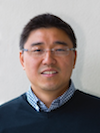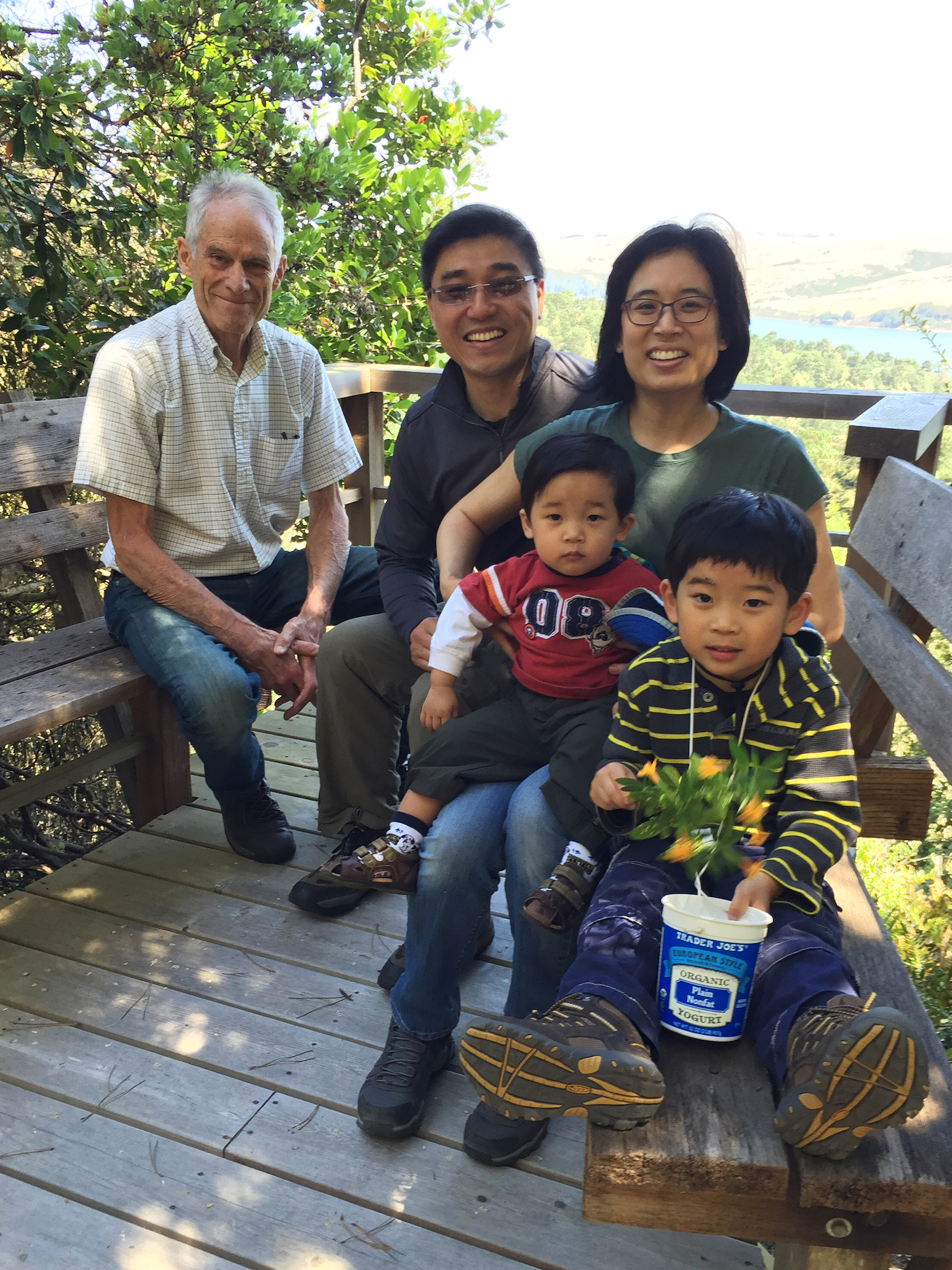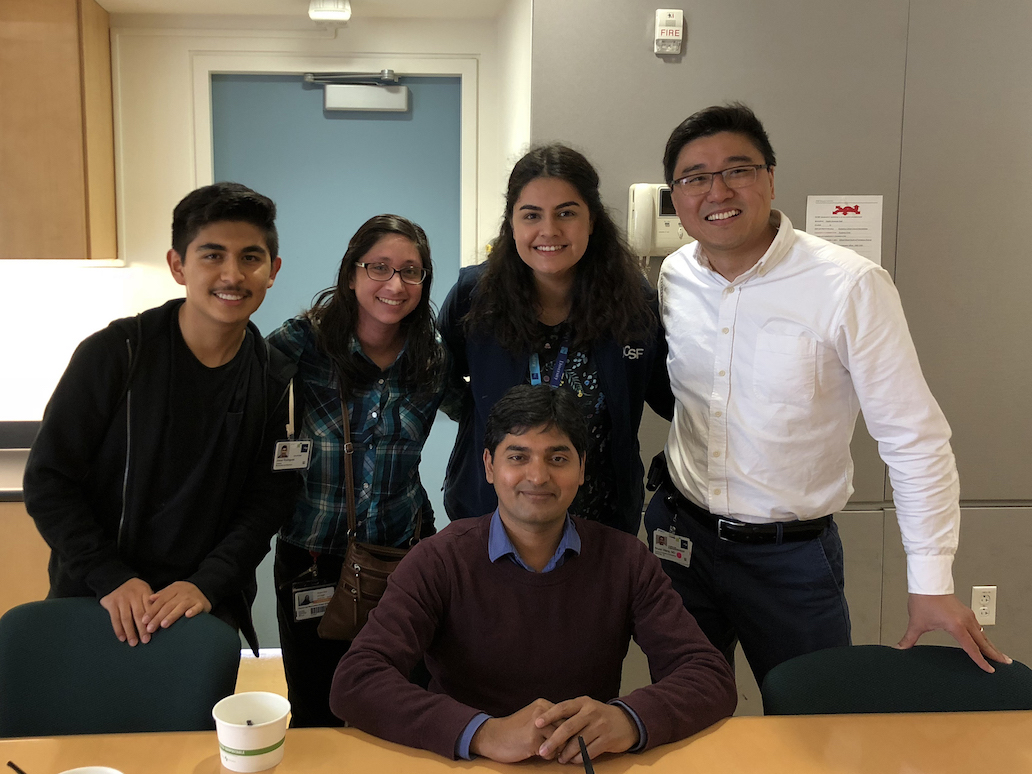Faculty Interview: Bruce Wang, MD
A Conversation with Bruce Wang, Assistant Professor in the UCSF Health Division of Gastroenterology
Please share what you really like about living in your particular neighborhood.

Assistant Professor
We live in Burlingame just off of 280, where the water department owns much of the land, so there are no houses behind us and what I really like is that it offers a sense of freedom for my kids to run around and be safe.
Tell me about your family.

I was born in Wuhan, in the central part of China, along the Yangtze River. It is geographically and weather-wise similar to St. Louis, Missouri, and it is an important hub of commerce in China. We still have family there and I recently took my family there, for the first time in ten years this past April. I am an only child and have lived in the Bay Area since I was thirteen. My father went to UC Davis for his graduate studies as an electrical engineer. When he got a job in the Silicon Valley, we moved to Fremont, where I went to high school. My father is still my personal hero because the year he was supposed to graduate and go to college was the same year of the Cultural Revolution. As was normal during those times, he was sent to the countryside, to a factory. For ten years, he studied on his own until he could eventually go to college, when he was thirty years old. He was 40 when he was a PhD candidate. My wife’s family is from Hong Kong and speaks Cantonese while my family speaks Mandarin - I speak to our two boys in English. They are in a Mandarin immersion program and learning to communicate in both languages.
Was becoming a scientist always your intended path?
I’ve been fascinated by biology since high school. I remember learning about a cell as a city, with roads that and factories where things are made, and a command center giving direction to the rest of the complex – that image excited me and made me want to learn more about cells and how they work. That’s how I think about science, in ways that are relatable.
When did you become fascinated by porphyrias, diseases of the liver?

As a medical student, I first did a summer of research under Monty Bissell, then Chief of the GI Division because I wanted to learn about liver fibrosis, how the liver becomes scarred after repeated injury, not necessarily porphyrias. It was rather chance that he offered me an opportunity to learn from one of the world’s experts in porphyria and has since been a mentor. He is a caring and generous person and what was most obvious to me was the way that his mentees speak of him and many of them are also mentors to me. As a medical student, early in my training, we attended an annual Hepatology meeting, where a special symposium was held for Monty, I think it was a lifetime achievement award. The common thread that everyone spoke about was his generosity with his time and energy, how much time he’d spent in editing their papers. Even now, I send him my drafts for review, and he still makes them better. He tries to promote the careers of his students and mentees. He is an amazing man.
Do you find a connection between science and the arts or have you other interests?
There is a lot of creativity in science but I see it as figuring out puzzles. Once you identify a significant question, then you search for tools and techniques but, if they do not exist, they must be invented. I don’t see myself as the type of scientist focusing on inventing tools and techniques, but I like to find and learn new techniques in order to solve scientific puzzles. I am more a sports guy and was a pole-vaulter in high school. Golf is my main sport and I try to play on a semi-regular basis, in fact, I just started taking my older son out to the driving range to see if he is interested in learning how to play. I try to play sports with my boys and watch sports, like basketball, with them. We are lucky in the Bay Area to have the 49ers, Giants, A’s and Sharks.
Can you remember your last favorite NPR driveway moment? What holds your interest?
Recently, I’ve been listening to the Tony Kornheiser Show. He is a longtime columnist with the Washington Post and, along with another columnist, hosts a spinoff podcast of a sports broadcast. They talk about other non-sports things as well, trending topics, current events and politics.
What is an everyday object that you could not live without?
In an emergency, I would grab my hard drive where our family photos and videos are stored, and maybe my cell phone.
What is an everyday object that you would just as soon toss in the bay?
Not so much an object as a way that we do things now that I wish we could do differently, like text messaging or email. I’ve always liked face-to-face interactions and having the spontaneity to just visit or talk with someone. It seems that everything must be planned ahead of time or scheduled – everything now is so regimented. If I have questions about how to conduct an experiment, rather than just pick up the phone and explain things or asking questions, we use electronic communication. Instead of just going to someone’s office, we have to first email someone to ask if we may ask him or her something and the back-and-forth seems to take longer than a simple conversation. I have an open-door policy that includes patients but I have a smaller clinical practice than do most of my colleagues.
What do you never tire of eating and who makes it best?
I do like to eat and there are so many foods that I like! In the fall, Chinese celebrate the mid-autumn festival when moon cakes are typically a specialty. Now, I have been much of a fan of moon cakes but, one year, we found some in Vancouver that are made with black sesame ice cream filling instead of red bean paste. We are going back in two months so I can get some more! I like soupy noodles, similar to pho, and fried rice, something my grandfather made with lard, scrambled eggs and sliced pork, and I could eat that all day. My father still makes a dessert, a fermented rice wine that is very sweet and enjoyed either cold or warm.
What little-known fact about you might surprise even longtime friends and colleagues?
Before I started medical school, I spent a year in China studying Chinese medicine and acupuncture. I didn’t pursue it but I am always willing to talk with patients about the possibility if they express interest. I studied the Philosophy of Science as an undergrad and was fascinated by how the two approaches to Medicine - if you will, Eastern and Western - are completely different from diagnosis to treatment.
Bruce, thank you so much.